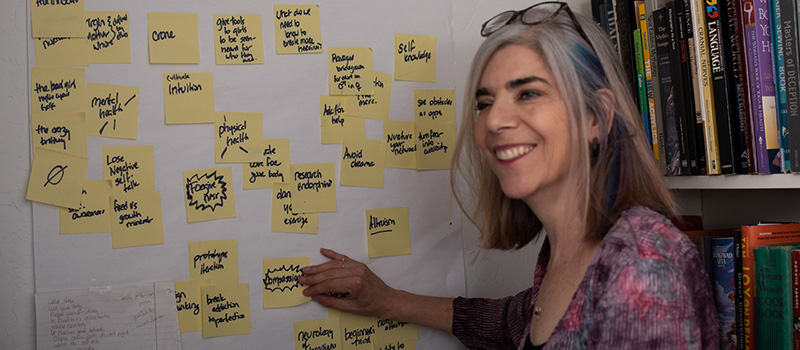Creating community and purpose through ritual
April 3, 2020 — For centuries, humans have used rituals to mark all types of transitions – from birth and graduation to marriage and death. These ceremonies provide meaning and purpose to life, and allow us to join together when events, whether joyous or sad, may seem overwhelming.
During the current global pandemic, says Janet (Poritsky) Ray ’86 – known professionally as Betty Ray – ritual is needed more than ever.
“Neuroscience shows that the habit and intentionality of ritual gives people a sense of peace. And when we practice it with others, ritual can galvanize our sense of belonging in community,” says the Oakland, California-based educator, consultant, and founder of the Center for Ritual Design.
Starting April 8, Ray is launching a free four-week online workshop, Creating Rituals to Cultivate Well-Being in a Pandemic. When so many people are feeling isolated and days have lost their structure, rituals can provide calm and meaning, she says.
“We’re lonely and it’s hard not being out and socializing,” says Ray, who’s married and the mother of an 11-year-old. Her family’s pandemic rituals include nightly dinners via Zoom with friends around the globe; lighting a candle each night that they are sheltering in place; and a moment of gratitude to thank everyone who makes their meal possible, from the farmers who grow the food to the truck drivers who transport it. “It brings us this whole feeling of inter-connectedness and awareness,” she says. “It’s a way to keep from being too despondent during this time.”
 Betty Ray ’86 stands in front of a series of post-in notes at the Center for Ritual Design. Ray is launching an online workshop called Creating Rituals to Cultivate Well-Being in a Pandemic.
Betty Ray ’86 stands in front of a series of post-in notes at the Center for Ritual Design. Ray is launching an online workshop called Creating Rituals to Cultivate Well-Being in a Pandemic.
Ray was a psychology major at Grinnell and was especially involved with KDIC, hosting a popular Wednesday night show where she showcased her beloved collection of soul, funk, and early hip-hop records. She spent her 20s traveling the world while working and taking classes in art, music, filmmaking, and audio/video production. The Twin Cities native returned to Minnesota and worked at Minnesota Public Radio, then moved to San Francisco in the late 1990s to get more involved in the rise of the internet.
For six years she was a DJ and director of community at Live365 (Internet radio), overseeing the growth and health of the network’s broadcasters and listeners. She then went to work at Edutopia, the website for the George Lucas Education Foundation. Ray spent a decade there guiding editorial strategy, creating community, and helping teachers share their ideas and research.
“I started to see what worked, and the pedagogies and instructional methods that engage young people and motivate them to develop to their fuller potential,” Ray says.
An article on the subject she wrote last year, How to Help Young People Transition Into Adulthood, was published in the University of California-Berkley’s Greater Good magazine.
In 2017 she went back to school at Teachers College, Columbia University, earning her master’s degree in psychology in education. Since then, Ray’s been researching, teaching, and talking about rituals for young people and adults. Through workshops and lectures, she explores how to give life purpose and meaning, especially during momentous events such as entering adulthood, divorce, mid-life, and now a global pandemic. The workshops help people understand what they are letting go of, what they want to bring in, strengths of current habits, and how to bring a more ritualized sense of contemplation to their transition.
“We all have things we do each day, like waking up, having coffee, and looking at the news. Those are habits,” explains Ray. “Rituals are conscious and bring a level of mindfulness and awareness to our habits. A morning ritual might be making coffee, then taking a pause to reflect on what’s important before writing in my journal all of my intentions for the day and how I want to approach them. It’s a simple intervention to make you more present in your life.”
—by Anne Stein '84
For your information:
To learn more about the Center for Ritual Design and register for the free four-week online workshop visit Betty Ray’s website.
To read more alumni news, check out our news archive.